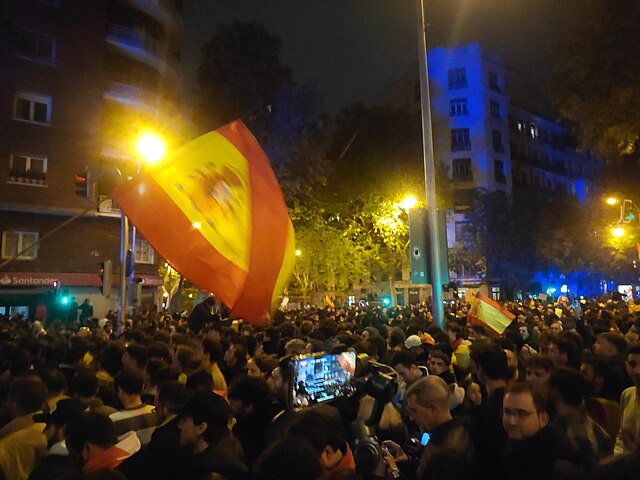
Please Follow us on Gab, Minds, Telegram, Rumble, GETTR, Truth Social, Twitter
With all eyes transfixed on the situation in Israel (and prior to that Ukraine) plenty of crucial political developments remain in the media’s peripheral vision, if not blind spot.
A whole slew of censorship-heavy legislation has entered into force in November at the EU level with the Digital Services Act and the UK Online Safety Act - both dressed up in rather innocent language. But that will be the subject of a future article / Eurobytes podcast.
On to Spain - Suddenly, for a brief moment, Spain catapulted itself on the front pages when a prominent politician, Alejo Vidal-Quadras (formerly of the Christian-Democrat PP and then with the populist right-wing Vox party) was shot in the face on 9 November, and survived. To make things yet more spectacular, the politician blamed the Iranian regime for this attempt on his life. The gunman, who wore a dark helmet, escaped on a motorcycle and is still at large.
Ordinarily, such an assassination attempt (with potential Iranian involvement) would be THE story for weeks to come. However, in the current, tumultuous Spanish politics it remains a side story - as currently Spain is facing a development that could very well break apart Spain as we know it. We will return to the assassination story towards the end of the article - but for now - let’s look at what is going on in Spain.
The Spanish National Election already took place in July 2023, but without any of the major parties winning a large enough majority to govern the country, Spain was left in limbo for months with difficult and lengthy coalition negotiations (that only ended on 16 November 2023). To simplify the electoral outcome: the ruling socialist party PSOE of Prime Minister Sánchez slightly expanded its share of the vote, whereas the Christian-Democrat party PP has made considerable gains (making it the strongest party). However, the populist right-wing party Vox lost a considerable share of their vote.
What, however, has proven to be explosive is Prime Minister Sánchez's choice of coalition partners: in total he managed to secure the support of six smaller parties, including the support of two Catalan separatist parties and two Basque parties. It is the support of these separatist parties that proves to be so explosive. The explosive part is an amnesty for all those Catalonian separatists who took part in the illegal referendum of 2017.
Rewind to 2017 - inspired by Scotland’s independence referendum in 2014 (a referendum that the Scottish separatist party SNP lost), the regional government in Catalonia asked to be granted such a referendum. The Spanish central government in Madrid refused. The Catalonian regional government decided to hold such a referendum anyway. The Spanish central government then declared it to be illegal. Consequently, a majority of the voters in Catalonia ignored this illegal referendum (turnout for the referendum was only 43%). However, a majority (90%) of those who did turn up for the referendum did vote for independence.
Low turnout or not - the Catalonian regional parliament declared independence on 27 of October 2017. The Spanish Parliament then imposed direct rule and dissolved the Catalonian parliament. The Spanish central government further cracked down hard on independence activists and sent hundreds of pro-independence figures to prison on charges of sedition. The architect of the illegal referendum Carlos Pugimont then fled to Brussels and now serves as a member of the European Parliament for the constituency of Waterloo, yes, I kid you not.
Whilst for now, this six party-deal keeps Sánchez in power - the (amnesty) deal with the separatists is controversial across the party spectrum - as many still regard the 2017 referendum as illegal and unconstitutional. Furthermore, many fear that amnesty concessions will pave the way for a future (legal or illegal) referendum.
The amnesty deal with the separatists is not even popular within Sánchez’s own PSOE party - during the negotiations even lifelong supporters have been overheard stating that they would support the Christian-democrat PP in any future elections if Sanchez goes ahead with his amnesty deal.
A much more in-depth article on the much more complex current crisis of Spain can be found in this article of the excellent alternative magazine The Critic.
Back to the assassination attempt - why does the victim of the attempt, Alejo Vidal-Quadras suspect Iran behind it?
Vidal-Quadras is an interesting character. He started out as a politician of the Christian-Democrat party PP and was among the founding members of the populist right party Vox. He left Vox in 2014 after failing to win a seat in a European Parliament election. However, he has been a known supporter of the Iranian opposition in exile. Apparently, this did not go unnoticed by the regime in Tehran and he was placed on a sanctions list in January by Iran for “supporting terrorist groups”.
A lot is happening in Europe that receives little media attention.
Even if particular issues receive plenty of attention within one country, as in the case of Spain’s separatist challenges, are Europeans getting animated about the right kind of issues? Aren’t there much more pressing issues to attend to?
Questions we will continue to ask at CD Media.
Subscribe to our evening newsletter to stay informed during these challenging times!!